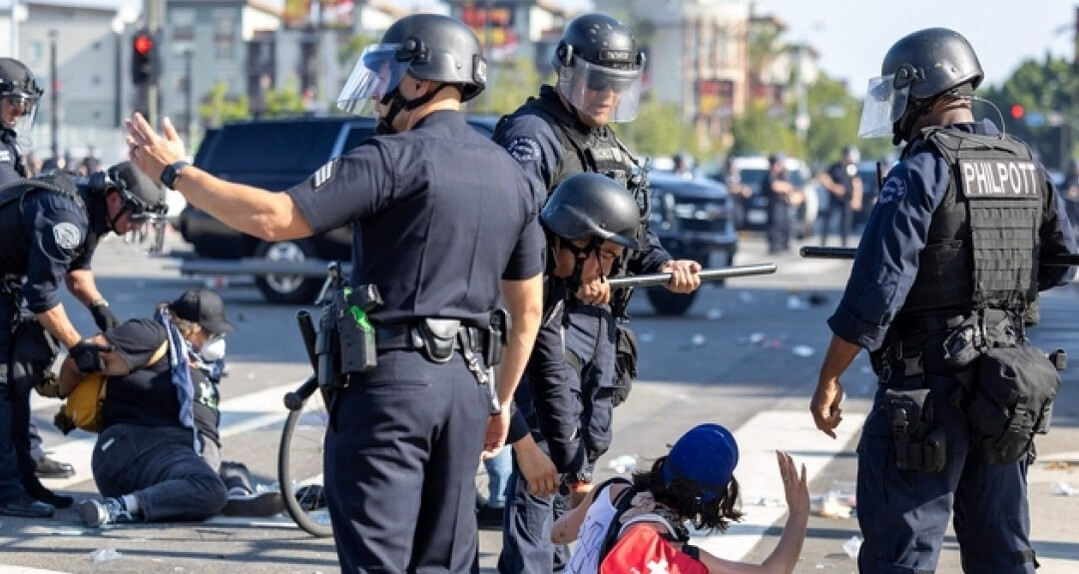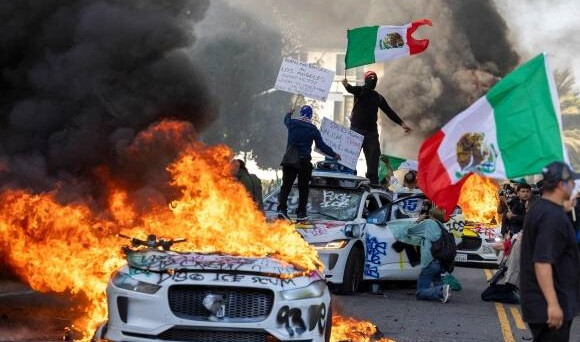
197 Detained on Day 5 of LA Protests… Spread to Over 20 Cities Including San Francisco, New York. Nationwide 'No Kings' Protests Announced for June 14, Trump's 79th Birthday and US Army's 250th Anniversary, Coinciding with Massive Washington Military Parade… Trump Warns of 'Tremendous Force,' Signaling Harsh Crackdown.
Large-scale protests sparked in Los Angeles (LA) in defiance of Donald Trump's intensified crackdown on undocumented immigrants are rapidly spreading to over 20 major cities across the United States, including San Francisco and New York, intensifying conflict within American society. The situation is poised to reach a critical turning point as nationwide anti-Trump protests are announced for June 14 (local time), coinciding with Trump's 79th birthday and the 250th anniversary of the U.S. Army, along with a massive military parade scheduled in Washington D.C. President Trump has warned of "tremendous force" in response to the protests, signaling a harsh crackdown and escalating tensions to a breaking point.
Curfew Imposed in Downtown LA… Detentions Mount Amid Escalating Protests
According to CNN, the Los Angeles Police Department (LAPD) announced that 197 individuals were detained on June 10 alone, the fifth day of the protests. LAPD Chief Jim McDonnell stated, "Arrests related to the protests have significantly increased in recent days," and warned sternly, "We will not tolerate actions that block roads, defy dispersal orders, and disrupt public safety." As the scale and intensity of the protests surpassed expectations, LA Mayor Karen Bass imposed a nighttime curfew in some parts of downtown LA on June 10. The curfew is from 8 p.m. to 6 a.m. the following day, affecting approximately 100,000 residents in the designated areas. Mayor Bass indicated the severity of the protest situation by stating that "the curfew is likely to last for several days."
The protests in LA primarily voice condemnation of the Immigration and Customs Enforcement (ICE)'s intensified crackdown on undocumented immigrants and large-scale deportation policies. Protesters marched carrying both American and Mexican flags, chanting slogans like "Immigration is not a crime" and "Don't tear families apart." Immigrant communities argue that the Trump administration's stringent immigration policies are destroying innocent families and infringing upon America's diversity and human rights.
Deployment of Military Troops Causes Conflict… California Governor Sues Trump Administration
The situation is becoming even more complex. With reports indicating that President Donald Trump is preparing to deploy military troops to quell the protests, tensions between the federal government and state governments are escalating. On June 11, California Governor Gavin Newsom filed an emergency injunction against President Trump and Secretary of Defense Pete Hegseth in the U.S. District Court for the Northern District of California. This action seeks to prevent the Trump administration from deploying military personnel to LA.
However, the court did not immediately accept the request, deciding instead to hold a formal hearing on June 12, indicating that the judiciary's decision will be a significant variable in this situation. Governor Newsom strongly criticized President Trump's plan to deploy the National Guard, stating that it was "choosing a show of force over public safety." He further blasted, "The Trump administration is not targeting undocumented immigrants and criminals, but rather indiscriminately targeting hardworking immigrant families and focusing on mass deportations." This can be interpreted as a warning that the justification for immigration policy could lead to actual human rights violations.
Protests Spreading Nationwide… June 14 as a Turning Point
The protests that began in LA have already spread across the entire United States. The New York Times (NYT) reported that citizens have also been arrested during protests in San Francisco, New York, and Austin, Texas. June 14 is particularly anticipated to be the biggest turning point in this situation. Coincidentally, this day marks President Trump's 79th birthday and the 250th anniversary of the U.S. Army, with a large-scale military parade scheduled in Washington D.C.
'50501', a civic group that has been organizing anti-Trump protests, announced that it plans to hold "No Kings" protests in over 1,500 locations nationwide, including Washington, on this day. The group's name, derived from the slogan "No Kings," symbolizes resistance against President Trump's authoritarian style of governance. They are expected to voice concerns about various issues beyond the Trump administration's immigration policies, including restrictions on abortion rights, climate change denial, and democratic backsliding. '50501' has a history of organizing large-scale protests against the Trump administration's policies, suggesting that the impact of the June 14 protests will be considerable.
President Trump warned that if protests occur during the military parade, they would "be met with tremendous force." This is interpreted as signaling a harsh crackdown on protesters, and the possibility of physical clashes cannot be ruled out. U.S. political analysts suggest that while President Trump's remarks are intended to rally his base, they could also further provoke protesters.

Historical Immigrant Protests and the Trump Administration's Hardline Stance
Conflicts and protests surrounding immigration policy have been continuous throughout U.S. history. In 2006, the "Great American Boycott" protests occurred nationwide in opposition to a bill for mass deportation of undocumented immigrants, bringing millions onto the streets. That protest was a symbolic event demonstrating the political influence of immigrant communities.
Since its inauguration, the Trump administration has pursued ultra-hardline policies on undocumented immigration under the banner of "America First." Examples include the construction of a border wall with Mexico, the forced separation of immigrant parents and children under a "zero tolerance policy," and attempts to abolish the DACA (Deferred Action for Childhood Arrivals) program. These policies have sparked strong opposition from human rights organizations, the Democratic Party, and immigrant communities, directly fueling the current protests. While the Trump administration argues that undocumented immigration poses a threat to national security and the economy, opponents contend that immigrants contribute significantly to the U.S. economy and society, and that immigration issues should be handled from a humanitarian perspective.
Future Outlook and Ripple Effects
The spread of these immigrant protests is likely to further deepen division and conflict in American society ahead of the 2024 presidential election. Immigration is one of the core issues between the Republican and Democratic parties, and these protests are expected to accelerate the mobilization of both sides' support bases. In particular, the nationwide protests scheduled for June 14 are expected to have a significant impact on President Trump's re-election campaign. If the protests do not end peacefully and escalate into physical clashes, it could cause greater turmoil in American society and heighten international concerns.
Furthermore, the immigration issue is not confined to internal U.S. affairs but can expand into an international issue. The U.S.'s hardline immigration policies have affected diplomatic relations with Central and South American countries, and concerns about potential humanitarian crises have been consistently raised. The world's attention is focused on whether these protests can lead to a change in U.S. immigration policy or trigger an even stronger crackdown.
In conclusion, the immigrant protests that began in Los Angeles are a symbolic manifestation of deep-seated opposition within American society to the Trump administration's stringent immigration policies. The nationwide protests scheduled for June 14 and President Trump's warning of "tremendous force" suggest that American society is facing a significant test. The world watches closely to see how the U.S. will resolve this immigration issue and protest situation, and achieve social integration.
[Copyright (c) Global Economic Times. All Rights Reserved.]




























